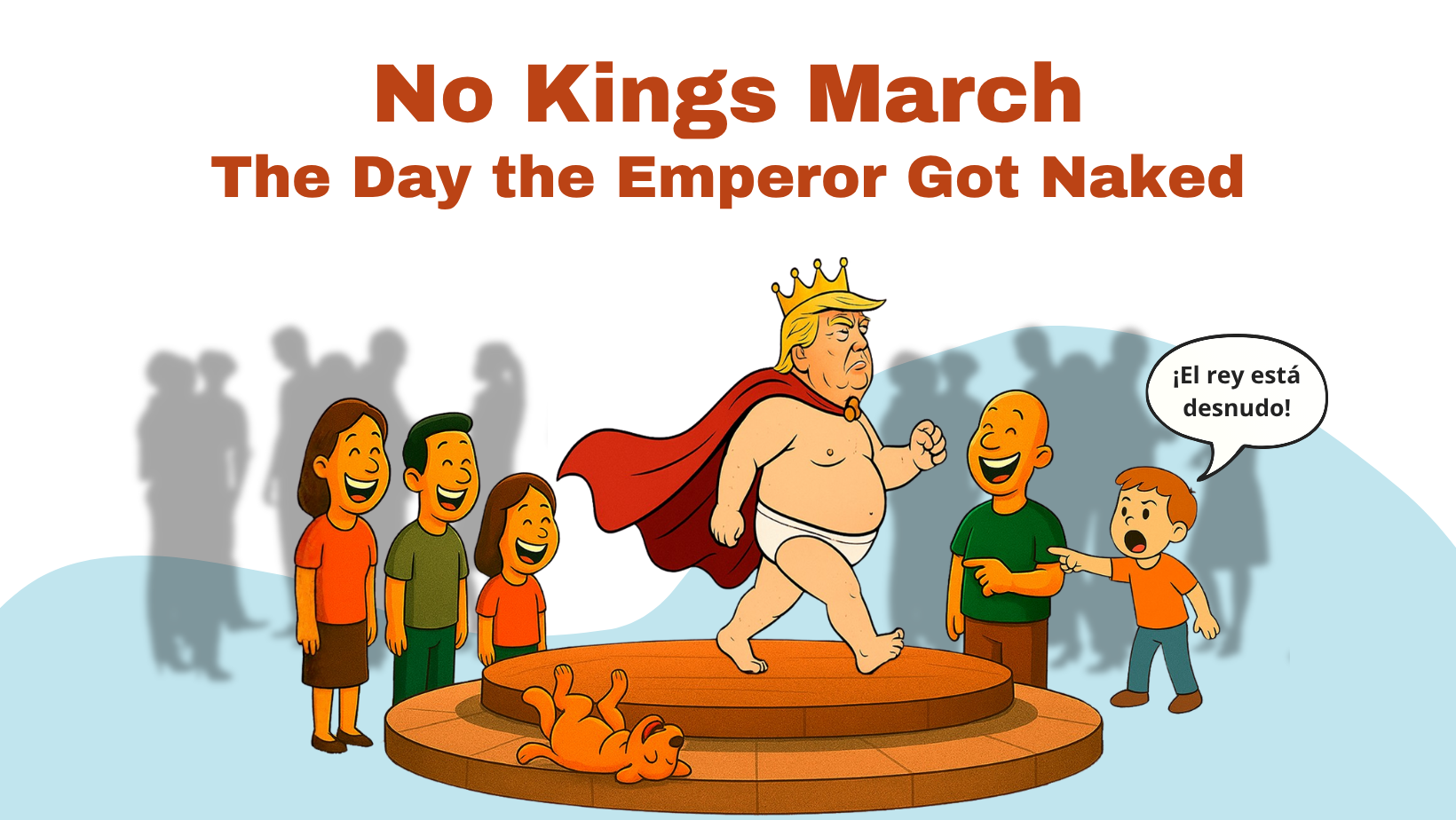
A Grammar Lesson in Democracy!
They called it the No Kings March — a reminder that in a democracy, verbs are meant to move, not rule.
It began like any other protest: banners high, chants rhythmic, grammar optional. But somewhere between the slogans and the selfies, something historic happened. The Emperor — yes, that Emperor — got naked.
It became more than a protest — it became a grammar lesson in democracy. A perfect story for anyone learning Spanish through the chaos of truth.
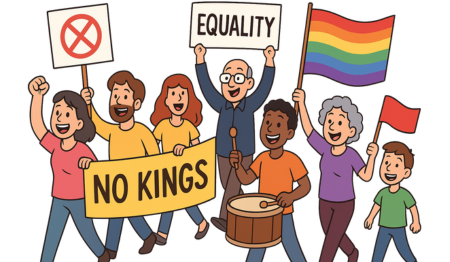
Not in the literal sense
No one needed that visual, but in the unmistakable way power sometimes undresses itself — with words, with ego, with a microphone left on. The crowd didn’t strip him; he did it all on his own, sentence by sentence, until even the commas gave up trying to hold his dignity together.
It was the day syntax met politics, and the crowd realized that every empire eventually runs out of adjectives.
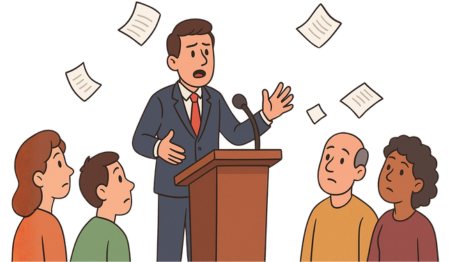
When Grammar Rebels
It started, as these things often do, with a word. A small, misplaced word that slipped out during a speech meant to sound presidential but came out more like a third-grade grammar exercise gone rogue. Well, after all, our emperor has a third-grader’s grasp of grammar.
The Emperor wasn’t just speaking — he was conjugating chaos. “We was… the greatest,” he declared, and just like that, the collective subject of democracy winced.

No Kings, No Nouns Without Consent
People had gathered to protest kings, not commas, but they suddenly realized the two weren’t that different. Both demand obedience. Both punish disagreement. And both, when exposed, look equally ridiculous.
That’s when the chants shifted — from “No kings!” to “No nouns without consent!” It was absurd, yes, but also strangely profound. Somewhere between grammar and government, the people had rediscovered the joy of correction — the kind that topples thrones without a single sword, just syntax.
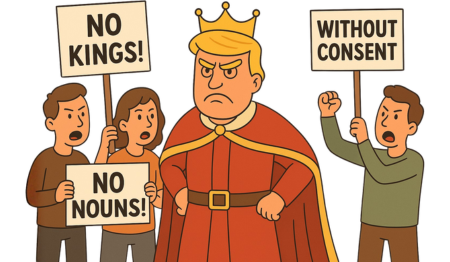
The Day Truth Switched Languages
It started like a fairy tale — just louder and bigger.
Thousands of feet, drums, cardboard signs bleeding ink, and voices that didn’t need royal approval. The No Kings March wasn’t fancy, but it spoke fluently.
And somewhere between the chants, a small voice cut through the megaphones:
“The king is naked!”
A few heads turned.
Then louder:
“¡El rey está desnudo!”
Silence. Then laughter. Then the sound of realization rolling through the crowd like thunder.
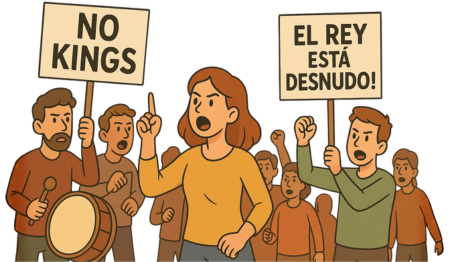
The Crowd Laughed
That kind of laughter that’s half joy, half relief.
Because in two languages, the kid had just said what millions had been thinking for years— —but keeping it buried, deep inside.
This time, the story wasn’t about a kingdom. It was about a country pretending not to see.
And the kid — bilingual, fearless, future — didn’t just point at the king.
This little kid just translated the truth.

The King Has No Clothes
This wasn’t just any protest. It was the No Kings march — a spontaneous grammar lesson in democracy. From D.C. to L.A., crowds rewrote the script of obedience. The message was simple: no crowns, no masters, no more polite silence.
And yet—somewhere between the chants and the microphones—silence still tried to sneak in. Not because people didn’t see the truth, but because they’d been taught not to say it.
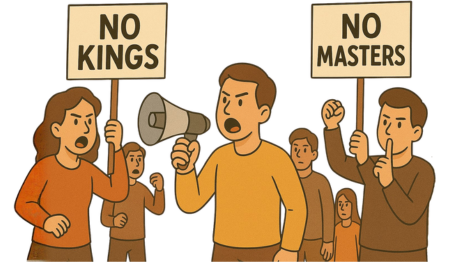
Once the King Got Naked
Once the kid said it, the spell cracked.
People laughed. Reporters tweeted. Hashtags multiplied faster than royal excuses.
Cameras zoomed in. Advisors panicked. One courtier fainted into a pile of “Made in China” silk.
And there he was — the King, orange-tinted and proud, gesturing toward the empty air around him. The next morning, the palace rolled out the damage control parade. Then came the live Fox News interview.
Reporter: “Mr. President, people are saying you’re… not wearing any clothes.”
Trump: “Fake news. I’m wearing tremendous clothes. The best. Everyone says so. Very exclusive fabric — you have to be smart to see it. Only geniuses see it, okay?”
Reporter: “Sir, people claim they can’t see anything.”
Trump: “That’s because they’re losers. Low IQ. Probably Democrats.”

Alternative Clothes for Alternative Facts
Then came Kellyanne Conway, smiling like she just trademarked reality itself:
“The President isn’t naked — he’s wearing alternative clothes. Very strong, very invisible, very real. The media just refuses to see them.”
Fox anchor: “So these invisible clothes… are they made in America?”
Conway: “Of course. 100% patriotism. Handwoven by freedom.”
The anchor tried to keep a straight face.
The fact-checker quit live on air.
Cut to the press pool — chaos, shouting, live tweets flying.

And the Crowd?
Meanwhile, the crowd outside was painting “NO KINGS” on walls, t-shirts, and cardboard signs.
Because once people see the truth bare and unfiltered, no spin doctor — no “alternative fact” — can dress it back up again.
They’d already seen too much — power stripped to its fragile ego.
So they marched. They shouted.
They turned “alternative facts” into punchlines and “greatness” into graffiti.
Because once truth shows up naked in the street, it doesn’t need to be polite.
It just needs to be heard.

The Etiquette of Obedience
Everyone sees it — the King has no clothes.
But centuries of etiquette whisper back: Don’t embarrass power.
Dress your critique in nice words. Add a title. A “Your Majesty.” A smile.
That’s how language gets tailored to obedience. Words become uniforms — pressed, polite, and loyal. They keep us proper while making the nakedness of authority look respectable.
And yet, sometimes, someone refuses the uniform. A child, a poet, a protester — someone who simply names the truth out loud. That voice cracks the spell.
Because truth, once spoken out loud, doesn’t wear clothes. It doesn’t need to.

The Sound of the Streets
The No Kings march didn’t sound like politics. It sounded like percussion — trash cans turned into drums, chants bouncing off buildings, and voices that refused to conjugate obedience.
Someone shouted, “¡Sin reyes, sin miedo!” Another yelled, “We don’t bow anymore!” Flags waved. Dogs barked. The air smelled like Sharpie, sweat, and street food.
It was chaos. It was grammar in motion.
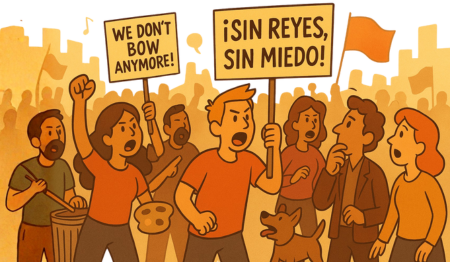
The Emperor’s Balcony
Meanwhile at the White Royal Palace, the balcony gleamed so bright it could blind anyone with common sense. The emperor leaned forward, chest puffed, arms flailing like a conductor of invisible disasters. His invisible tie twitched like it had a mind of its own — probably wondering, why am I here?
Banners fluttered behind him, looking less like protest signs and more like leftover Halloween decorations. The crowd squinted, half amazed, half convinced they were in a fever dream. Somewhere in the back, a kid muttered, “This is actually happening,” and no one argued.
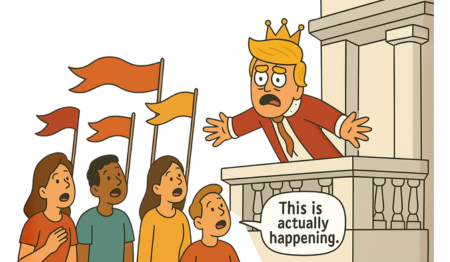
Chaos Below
Courtiers scrambled like they were auditioning for a reality show called The Apprentice: Keeping Up with the King. One fanned the air with a gold scroll. Another tried to steady a chandelier that clearly had better things to do.
Reporters squinted into the sun, microphones dangling uselessly. A photographer clicked the perfect shot: a crown tipping, a hand frozen mid-clap, and the Emperor’s tie flapping like a surrender flag. Reality didn’t stand a chance.
One courtier whispered to another: “Do we tell him the clothes aren’t real?”
The other shrugged: “Nah, he hasn’t noticed yet.”
His crowd oblivious to his nakedness kept cheering and applauding him.

That’s How Empires Survive!
Not through silk or armor, but through applause loud enough to drown out reality.
And that was it — the empire’s last thread of dignity, spun live on national television.
People laughed, marched, and tagged their posts with new slogans:
“Make Actuality Great Again.”
…pause…
“No Kings. No Spin.”
Because when truth finally steps into the street, it doesn’t ask for permission —
and it sure as hell doesn’t wear a suit.

The New Voice of America
That kid — the one who yelled “El rey está desnudo!” — wasn’t just calling out a naked king.
They were calling out an old accent.
Because the old voice of America spoke in press releases.
The new one speaks in Spanglish, rhythm, and nerve.
It switches tongues mid-sentence and still makes perfect sense.
And that’s what scares power the most — not the noise, but the fluency.
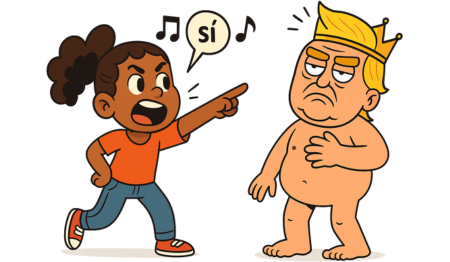
The Grammar of Resistance
This wasn’t grammar class. But everyone out there knew exactly how to conjugate resist. The chants rose and fell like verbs in motion.
We march. We resist. We demand. A living conjugation of dissent.
You didn’t need a degree in linguistics to understand the syntax of rage. Every shout was a sentence. Every banner a paragraph.
That day, the city turned into a book — one written by the people, not approved by the crown.

The People Who Spoke Anyway
Truth alone is fragile. It trembles in private conversations and late-night texts. But when it hits the streets, it gets a spine.
That’s what the No Kings march did — it gave backbone to what everyone had been whispering for years.
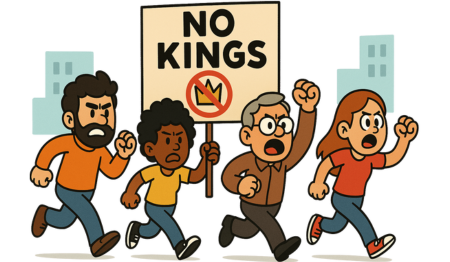
The Noise That Matters
Power pretends to hate chaos, but it fears clarity even more. It survives on confusion — on citizens who shrug and say, “That’s just how things are.”
But a crowd chanting in unison? That’s clarity with a megaphone. Every voice saying, “We see you,” strips another layer off the costume of authority.

The Syntax of Defiance
The slogans weren’t polished. The signs were misspelled. None of it mattered.
“Ni una menos.”
“No justice, no peace.”
“Hands up, don’t shoot.”
Different grammar, same message: We’re done pretending the King is clothed.
Language became muscle. Sound became action. Protest became translation — turning fear into sentences, silence into sound.
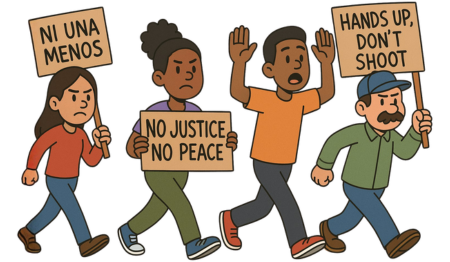
When the Echo Reached the Palace
Even the palace walls heard it — not literally, but politically. That’s what real noise does: it seeps into rooms where power thought it could sleep.
Power, for all its noise, depends on quiet. It thrives on polite disbelief. But public will — that collective enough — is a language even the most insulated leader can’t ignore.
That’s why they fear crowds more than critics. Because when people stop whispering, monarchy — literal or political — starts to melt.
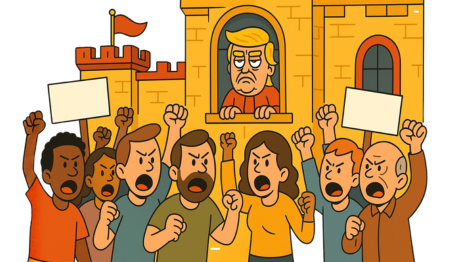
The Etymology of Rebellion
The word protest comes from Latin pro testari, meaning “to declare publicly, to bear witness.” The root isn’t violence. It’s testimony. To protest is to speak truth in the open.
And that’s what people forget: every rebellion begins with language. With naming what others try to erase.
When Latin itself fell, it wasn’t defeated by swords. It dissolved into the voices of farmers, mothers, and soldiers who refused to pronounce it the way Rome demanded. The vulgar tongues — the people’s speech — became Spanish, French, Italian. Democracy began in the mouth.
When Latin fell, Spanish rose — not by decree, but by disobedience.
Every language, at its birth, is an act of protest. Every accent, a form of survival. Every idiom, a history of defiance hidden in sound.
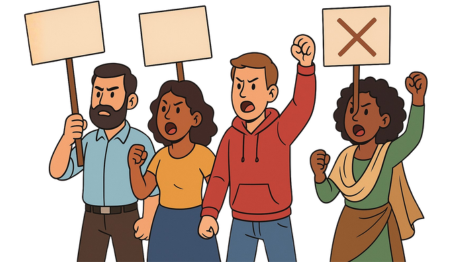
Classroom Revolution — KDF Style
The morning after the march, our classroom felt different. Someone still had glitter on their face. Someone else came in with a hoarse voice from chanting. And someone — bless their idealism — brought empanadas for everyone.
“Today,” I said, “we conjugate gritar (to shout), resistir (to resist), and esperar (to hope). Three verbs, one revolution.”
A student raised her hand: “How do you say ‘He who shall not be orange’ in Spanish?” The class laughed. Another added, “Can we use the subjunctive to imagine a better president?”
Exactly. Because that’s the thing about language — it’s not just communication. It’s imagination. It lets us shape what doesn’t exist yet. It’s not about grammar; it’s about possibility.
At KDF, we don’t just teach you how to say I can. We teach you how to mean it.

No Kings in Grammar
Here’s the thing: grammar isn’t a monarchy. There are no kings, no divine rules. There are only people agreeing on meaning, adapting, changing, reinventing.
Monarchies demand obedience. Living languages demand participation.
Every time you use slang, you dethrone a royal. Every time you invent a word, you stage a coup. The Real Academia Española tried to ban selfie. Good luck with that, your majesties.
Every accent is a flag. Every slang word, a revolution. Every meme, a manifesto. Language doesn’t belong to kings — it belongs to whoever dares to speak.

From Empires to Emojis
Once upon a time, empires use to control language with swords and decrees. Now, TikTok does it with 15 seconds of audacity. We went from Latin edicts to hashtag revolutions.
Rome imposed Latin. Spain imposed Spanish. And now? Gen Z imposes vibes.
The timeline of language is a timeline of rebellion: from the fall of Rome to the rise of Spanglish. From Inquisition Spanish to immigrant English. From sacred texts to memes.
And emojis? The people’s pictographs. The new hieroglyphics of feeling. If the king’s English was meant to control meaning, emojis liberated it.
Language always finds a way to escape its cage.
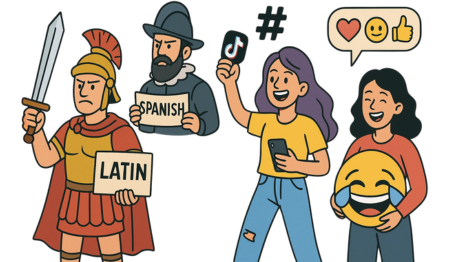
The Politics of Voice
Grammar mirrors society more than we think.
- Active voice: taking responsibility. We made change.
- Passive voice: hiding power. Mistakes were made.
- Imperative mood: protest slogans. Say her name. Stop the war. Vote.
- Subjunctive mood: hope. Que podamos vivir sin miedo. (May we live without fear.)
Even punctuation has politics. Periods are final, exclamation marks are defiant, and ellipses are for those who refuse to finish the sentence. The same grammar that teaches order can also teach resistance.
We march → marchamos.
We rise → nos alzamos.
We resist → resistimos.
We hope → que podamos.
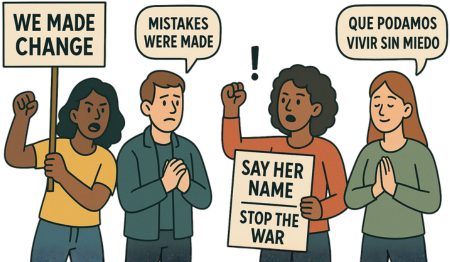
Rebellion in Translation
Multilingualism itself is a protest. Every time you code-switch, you challenge a hierarchy. Every time you speak with an accent, you carry your history in your throat.
Colonizers tried to erase tongues like Quechua, Nahuatl, Aymara — but they’re still here, breathing between the lines of Spanish. They survived centuries of crowns, crosses, and classrooms.
In Quechua, there’s no word for king. Just ayllu — community. Try colonizing that.
And let’s be honest: tell a Peruvian abuela not to code-switch, and she’ll switch you instead. Just ask Abuela Norma Lita Nomas, who helped her granddaughter María find the thread between humor, language, and power
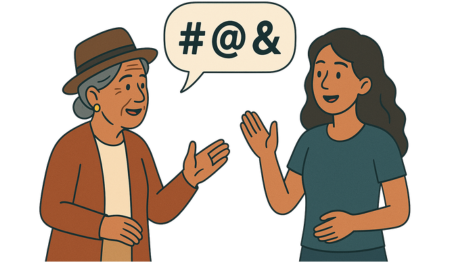
The Modern Monarchs
We like to think we’ve outgrown kings, but we just gave them new names: CEO, President, Influencer. Crowns replaced by blue checkmarks.
The difference? Now we get to talk back. Social media turned the royal decree into a comment section.
But the danger remains. Authoritarians don’t fear weapons — they fear words. Because words create meaning, and meaning builds power. The moment a people starts renaming their world, the throne starts shaking.
When leaders start banning words, you know they’re afraid of meaning.
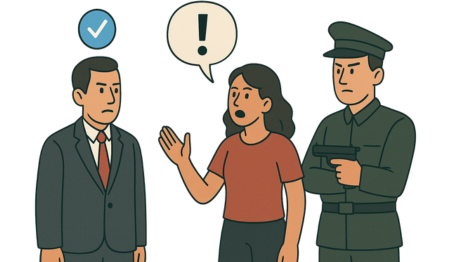
Language as Democracy
Democracy and language share the same DNA: participation. They both depend on everyone having a voice, and no one owning the rules.
Grammar isn’t top-down — it’s a collective agreement. It evolves through use, through listening. The same way democracy must.
Maybe freedom isn’t found in the ballot box or the grammar book, but somewhere between yo puedo and we will.
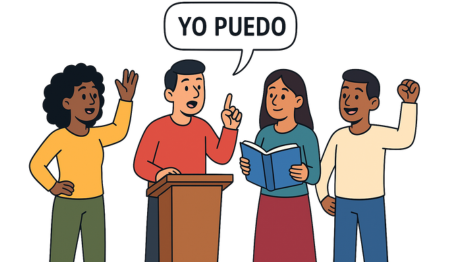
The Last Verb
Empires crumble. Statues fall. Monarchs fade. But verbs remain.
Because as long as we can say I am, we are, yo existo, nosotros seguimos, no one can silence us completely.
No kings. Just voices. And that’s enough. Yo marcho. Tú marchas. Nous résistons. We rise.
Wanna know more?
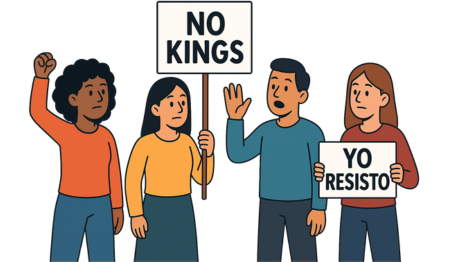
Phrases to Take to the Streets — or to Your Spanish Class
Before you join any march — literal or grammatical — it helps to know the words. Below is a chart of key phrases inspired by the No Kings March. Use them to shout, chant, or simply understand the spirit of rebellion in two languages:
| English Phrase | Spanish Phrase | Use / Context |
|---|---|---|
| No Kings! | ¡No hay reyes! | General protest chant |
| The King is naked! | ¡El rey está desnudo! | Call out obvious truths |
| We resist! | ¡Resistimos! | Show collective action |
| Speak the truth | Di la verdad | Remind others to voice facts |
| No obedience without consent | No hay obediencia sin consentimiento | Playful grammar protest |
🌍 ¡Habla como luchas!
Speak the Way You Fight: It became more than a protest — it became a grammar lesson in democracy.
The No Kings March wasn’t just a story — it was real. A cry for democracy, dignity, and maybe even better grammar. A reminder that words, like people, deserve freedom.
And in every language, that freedom begins with how we speak, think, and learn.Before you hit the streets—or your Spanish class—it’s essential to know the words that fuel revolutions. Dive into our guide on Spanish for Protesting to arm yourself with the language of resistance.
🔗 Spanish for Protesting: Speak the Way You Fight
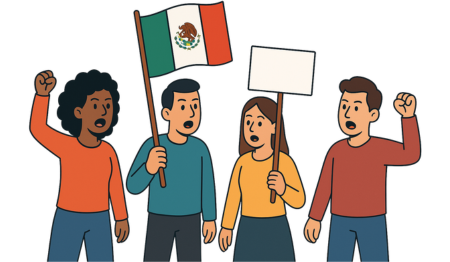
📰 Politics in Spanish
Verbs march — hablar, protestar, resistir. To speak is already to rebel.
For more context on political movements, activism, and leadership chaos—Trump-style or otherwise—explore our full collection of articles on geopolitics in Spanish:
🔗 Trump, Politics & More: KDF Blog – Geo-Politics in Spanish
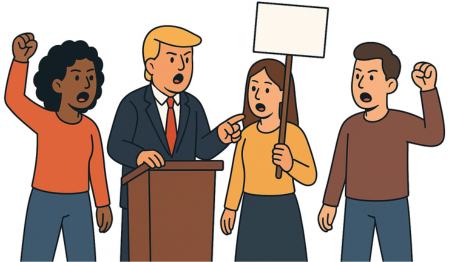
Spanish Learning in Action — KDF Style
Just like our kid in the No Kings March switched languages to reveal the truth, learning Spanish at KDF teaches you to switch, express, and participate.
Bilingualism isn’t just a skill — it’s a superpower. Pamela Chu proved it when she faced the Super Spanish Villain.
Every chant, every phrase, every playful protest line becomes a lesson in vocabulary, grammar, and cultural awareness
At KDF, we don’t just teach you words. We teach you voice. Just like the No Kings march showed: truth doesn’t ask permission, and language doesn’t obey silence. From “yo existo” to “nos alzamos,” you learn to move ideas, not just sentences.

Claim Your Voice — Try a Free Spanish Lesson
Ready to make your own statements? To conjugate, code-switch, and create your own linguistic rebellion? KDF invites you to a free Spanish lesson. No kings. No rules. Just your voice.
Because whether in the streets or the classroom, language belongs to those who speak it boldly. At Kasa de Franko, we don’t just teach conjugations — we teach insurrections of speech.

